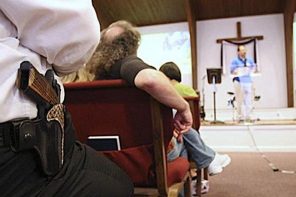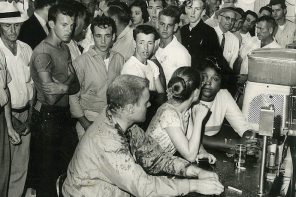I write and say in many places that President-elect Obama, as an individual, represents the ability to talk more intelligently about some of the deepest things that divide us as Americans. Much has been made of his race, and his biracial, multi-ethnic background is only one part of his complex identity that forces to think beyond our either/or labeling constructions. He is simultaneously both black and white and neither black nor white. His religious identity is far more clear cut: his first name indicates he is either Jewish or Muslim; his second name very “Muslim,” and very “Shi’ah;” his last name is not as rich in terms of religious possibilities. However, he is a Christian. Although religious identities in the modern period are more rigidly defined than racial identities, his names reveal a complexity of religious engagement that can hopefully move us beyond a tribal sense of religion.
However, I am concerned that as we say the Obama Presidency will move us into a post-partisan, post-racial, post-ethnic, post-religious America, it is really a way to brush aside concerns that we have not adequately addressed as a nation. By electing Barack Obama some people will argue that we have moved beyond our failings in thought, speech, and act in all these areas. Instead, I believe we must seize his election, his person, as a way to understand how we can talk about our various identifications, the things that make up our identity, in a more nuanced and sympathetic way. In particular, although I believe the US is a deeply religious country, I do not believe we have a sophisticated language with which to talk about religion. I fear that if we start talking about a post-religious America to mean religion does not matter, than an important part of cultural and political life is lost, and many of the errors we made over the decade in discussing religion in the public sphere will come back in an even more vicious form.
When I think of a post-religious America, I think of it in a way similar to how David Hollinger takes about ethnicity in his work Postethnic America. He argues that a post-ethnic America is not one where ethnicity is ignored, but where it is taken more seriously because people stop ascribing ethnicity onto others, they recognize that individuals are capable of identifying themselves. He discusses the difference between a pluralist worldview, which leans toward unitary, ascriptive identities, and a cosmopolitan worldview, which “promotes multiple identities, emphasizes the dynamic and changing character of many groups, and is responsive to the potential for creating new cultural combinations” (pg. 3-4).
Carl Ernst, in Following Muhammad, bridges the relationship between ethnicity and religion by stating “in medieval empires, unlike today, ethnicity rather than religion was often a more important marker of identity” (pg. 120). He also highlights the problem with the way Islam is presented – a problem that I believe across religious traditions – as being ascriptive. He says:
It is customary in books that survey the Islamic faith to present a summary and overview of basic religious practices and beliefs. The problem with the textbook approach is that it outlines these catechisms and religious requirements in the abstract, without much reference either to multiple schools of thought or to the history of Islamic religious practice in different regions. In this respect, it can be difficult to distinguish between a textbook summary of basic practices and the preaching or religious instruction that one might encounter in a mosque. … While there is nothing wrong with that approach in prescriptive teaching for the faith community, it is the aim of this book to offer a descriptive interpretation of the range of Islamic history and practice.
pg. 108
Although a well-done prescriptive or ascriptive text can contribute a pluralistic understanding, it reifies and hardens identities that have not traditionally been impermeable. If we are serious about entering a post-religious phase of American faith, we need to take religion seriously at a personal level. I mean that we cannot learn about people of faith by treating faith communities as monoliths. We need to understand that it is individuals that make up a community. When we understand individual motivation, we can better understand community action. In looking at people, I believe we will find that we have many of the same concerns in common. How we address those concerns are where the differences lie. The approaches we take are framed by our religious traditions. Sometimes these approaches will be sympathetic across traditions, and other times not. However, it is not an inherent difference between traditions, as we find these same tensions within traditions. Individual understandings, experience, and cultural contexts. In essence, the individual is key.
I do not know what shape a post-religious America will look like, but I am getting a sense of what the first steps to get there will look like. There are two youth-oriented programs that I believe address two of the issues I raise: taking faith seriously and discussing it at the level of the individual. The Interfaith Youth Core and Face to Face/Faith to Faith offer intriguing models as to how we can have a generation of people in this country who are proud of their religious identification, can articulate it, and are willing to approach others with an open mind. Both programs have been running for long enough now that I think we will begin to see what the long-term results look like. I hope that these young leaders can move the country as a whole to a more sophisticated discussion of religion in America.



